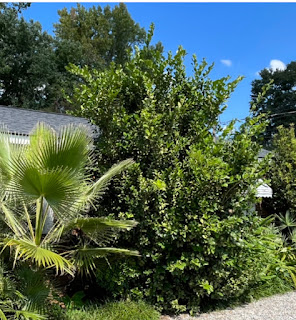Keraji Mandarin
Texas Lemonade Tree
Keraji mandarin exemplifies how much fun citrus can be. This little mandarin is rarely found in nurseries, and the fruit never featured in stores. It's a little obscure, particularly here in Georgia. But everyone who tries a Keraji fruit inevitably asks where they can get a tree.
Keraji mandarin produces a small, yellow "tangerine" that peels as easily as any citrus in that category. Its small size and ease of peel removal makes it perfect for children, who love the lemonade candy taste. In Texas, Keraji is also called the "Lemonade tangerine," because it tastes just like it. Once a tree starts producing, it will produce prodigious quantities of fruits every year - so many that fruit will hang on the tree for months. The fruit taste great for a long, long time, and unless frozen off, will remain in good condition on the tree almost until the next bloom cycle.
Fruit vary in seediness, probably in response to the availability of other citrus to cross-pollinate. Some fruit are seedless, while others will have as many as two seeds in each of the fruit's 10 sections.
Keraji grows true from seed and grows very well on its own roots. It will make a fairly large tree up to 20 feet tall. Like many mandarins, it tolerates short freezes (less than 48 hours in duration) well as long as the temperature doesn't fall much below 15F. In December 2022, my large tree on its own roots (pictured here in the summer of 2022) lost the top 1/3 growth after 11F and 55+ hours of below 32F. Honestly, I'm thankful it survived.
The trees are extremely vigorous and make outstanding ornamental plants. The one drawback (in my experience) is that Keraji tends to be a magnet for certain pests such as scale and whitefly.
I have been growing Keraji since 1996, and it has proven to be a reliable and delightful citrus. My children loved picking the small fruits and eating them in the yard and taking several to school for lunch.







Comments
Post a Comment